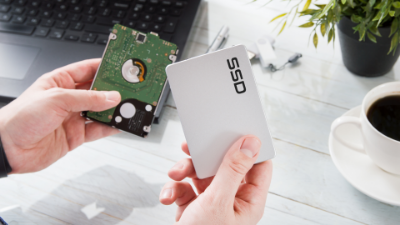In the ever-evolving landscape of computer hardware, one term that frequently pops up is "SSD," short for Solid State Drive. But what exactly is an SSD, and is it worth investing in for your laptop? Let's dive into the realm of SSDs and explore why they're more than just a buzzword in the tech world.
WHAT IS AN SSD?
SSDs are storage devices that use flash memory to store data repeatedly. Unlike traditional Hard Disk Drives (HDDs), which store data magnetically and rely on spinning disks and moving parts, SSDs store information electronically, resulting in faster performance and improved durability.
BENEFITS OF AN SSD
Blazing Speeds:
One of the most noticeable advantages of an SSD is its incredible speed. Traditional HDDs have mechanical arms that physically move to access data, leading to slower read and write speeds. SSDs, on the other hand, offer lightning-fast performance, significantly reducing boot times, application launch times, and file transfer speeds.
Enhanced Durability:
Unlike HDDs, which are prone to damage from physical shocks and vibrations due to their mechanical components, SSDs are inherently more durable. Since SSDs have no moving parts, they're better equipped to withstand accidental drops or bumps, making them ideal for laptops that are frequently on the go.
Improved Power Efficiency:
SSDs consume less power compared to traditional HDDs, resulting in improved battery life for your laptop. The absence of spinning disks and moving parts means that SSDs require less energy to operate, allowing you to enjoy longer usage times between charges.
Silent Operation:
HDDs can be noisy due to the spinning platters and moving read/write heads, especially during intensive read/write operations. In contrast, SSDs operate silently since they don't have any mechanical components. This silent operation not only enhances the overall user experience by reducing distractions but also makes SSDs ideal for environments where noise pollution is a concern, such as libraries or shared workspaces.
Compact Form Factor:
SSDs are typically smaller and lighter than HDDs, allowing for sleeker and more portable laptop designs. This compact form factor not only contributes to the aesthetic appeal of your laptop but also makes it easier to carry around. Whether you're a frequent traveler or a student rushing between classes, a laptop equipped with an SSD offers unmatched portability without sacrificing performance.
WHEN SSD’S MIGHT NOT BE WORTH IT
While SSDs offer numerous benefits, there are situations where they might not justify the investment:
Budget Constraints:
SSDs tend to be more expensive per gigabyte compared to HDDs. If you're on a tight budget and require a large amount of storage space, opting for a traditional HDD might be more cost-effective.
Storage Requirements:
If you rely heavily on storage space for storing large files, such as videos, photos, or games, the limited capacity of SSDs might not suffice. In such cases, a combination of an SSD for the operating system and frequently used applications, along with a secondary HDD for storage, could be a viable solution.
Legacy Hardware Compatibility:
Older laptops or desktops might not have the necessary interface or compatibility to support SSDs. In such instances, upgrading the storage to an SSD might require additional hardware upgrades, increasing the overall cost and complexity of the upgrade process.
Specialised Workloads:
Certain specialised workloads, such as heavy video editing or data analysis tasks, might benefit from the high capacity and lower cost-per-gigabyte offered by HDDs. Assessing your specific usage requirements and workload demands is crucial in determining whether an SSD is the right choice for your laptop.
Incorporating an SSD into your laptop is more than just a hardware upgrade - it's a game-changer that can revolutionise your computing experience. From faster boot times and seamless multitasking to enhanced durability and improved power efficiency, SSDs offer a myriad of benefits that justify the investment. However, there are instances where they might not be the optimal solution for your needs. By weighing the pros and cons, you can make an informed choice that maximises the performance and functionality of your laptop within your unique circumstances.
If you need any further assistance with incorporating an SSD into your laptop, get in touch with us. Visit https://www.laptopplus.com.au/



